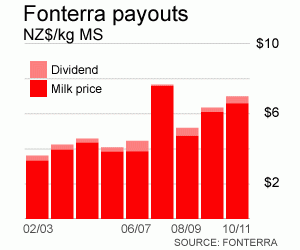
Fonterra has announced that prices fell around 3.5% in its June globalDairyTrade internet auction of various milk powders and commodity products.
The gDT-TWI index of prices was down 3.5% from Fonterra's May auction, which globalDairyTrade described as stable.
The average price of anhydrous milk fat rose 5.9% to US$5,324/tonne, while skim milk powder prices fell 6.2% to US$3,462 and whole milk powder fell 3.4% to US$3,790.
GlobalDairyTrade Manager Paul Grave said the market continued to be relatively stable with supply factors the primary driver of market sentiment.
So what?
Fonterra announced late last month its first forecast for the 2010/11 payout of around NZ$7/kg, with the potential to rise to a record NZ$8/kg if the currency stayed down at current levels and commodity prices remained firm. This is up from around NZ$6.50/kg in 2009/10.
Fonterra's payout is a key driver of activity in New Zealand's provincial economies, particularly Waikato, Canterbury, Southland, the Manawatu, Northland and Taranaki. However, this payout rise is most likely to be used for debt reduction and to cover higher feed and energy costs, rather than be pumped into spending in the rural economies. Alongside the New Zealand dollar, the Official Cash Rate and the unemployment rate, the Fonterra payout is a key indicator of how strong the economy is and where interest rates might be headed.
Dairy commodity prices have almost doubled from their early 2009 lows in rapid time, but appear to have stabilised at these record levels. It is one of the factors pushing the Reserve Bank to take some of the heat out of the economy. The interactive chart below has the best picture.
The Reserve Bank is widely expected to hike the OCR from 2.5% in the next two months, pushing up term deposit and mortgage rates, although the OCR is not expected to be raised as far or as fast as in previous recoveries because banks are less able to lend quickly and are being forced by shareholders and regulators to fund their lending locally, rather than from 'hot' money markets.
This means floating mortgage rates are likely to remain less than fixed rates for some time, given fixed rates are funded more from these 'hot' international markets. Term deposit rates will continue to rise and be significantly higher than the Official Cash Rate as banks compete hard for funds.

We welcome your comments below. If you are not already registered, please register to comment
Remember we welcome robust, respectful and insightful debate. We don't welcome abusive or defamatory comments and will de-register those repeatedly making such comments. Our current comment policy is here.